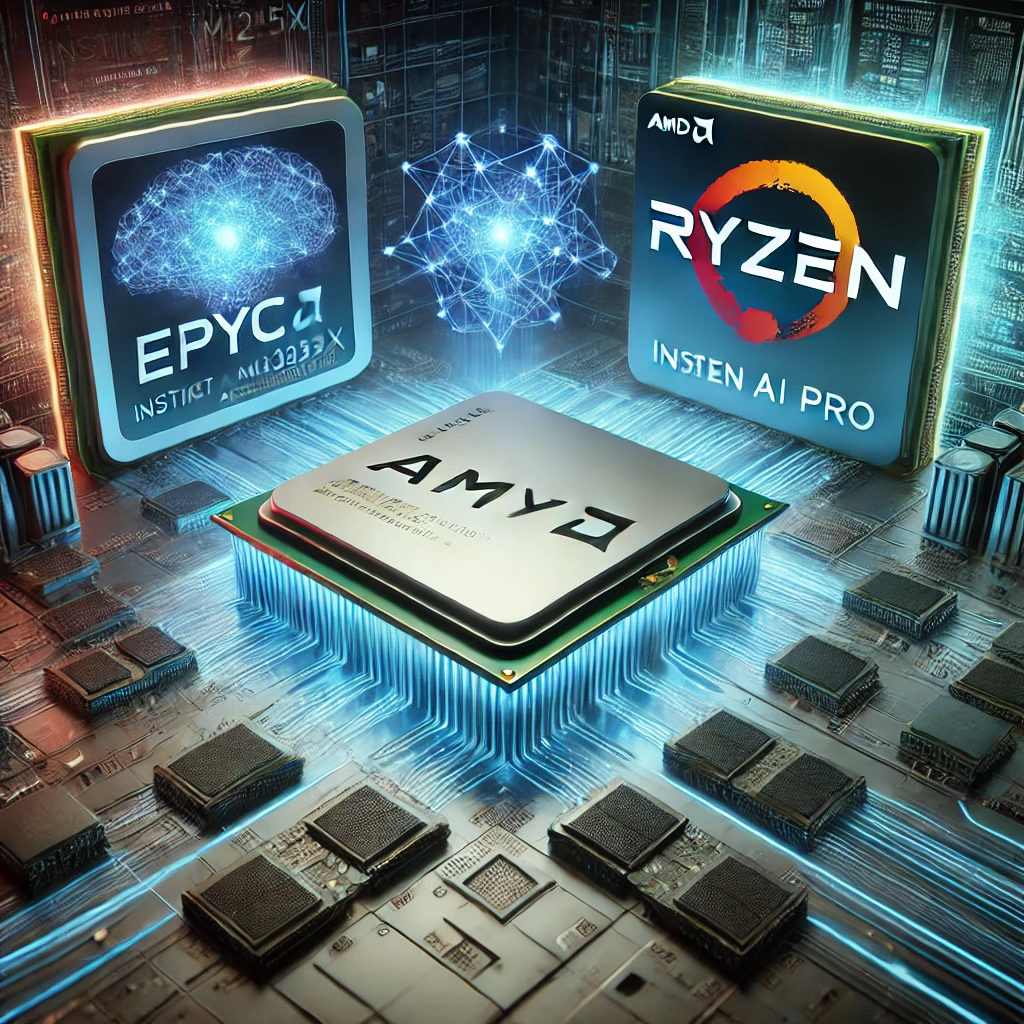AMD has officially introduced its latest AI hardware, signaling a bold step in its ongoing rivalry with Nvidia and Intel. At a high-profile event, AMD showcased its newest line of products, including the 5th Gen AMD EPYC CPUs for servers, the Instinct MI325X AI accelerator, and the Ryzen AI PRO 300 processors aimed at AI-powered PCs for enterprise customers. These releases position AMD as a serious contender in the rapidly growing AI hardware market.
The 5th Gen AMD EPYC CPUs are designed to deliver exceptional performance in server environments, targeting workloads such as cloud computing, data analytics, and high-performance computing (HPC). Known for their industry-leading power efficiency and multi-core capabilities, the new EPYC chips are expected to offer enhanced processing power for AI training and inference, as well as traditional enterprise computing tasks. AMD’s server CPUs will directly compete with Intel’s Xeon processors, which have dominated data centers for years.
Alongside the EPYC chips, AMD also revealed details about its highly anticipated Instinct MI325X AI accelerator, a major leap forward in AI-specific hardware. The Instinct series is designed for deep learning, high-performance machine learning, and AI model training, directly competing with Nvidia’s dominant A100 and H100 GPUs. The MI325X offers increased throughput, power efficiency, and support for large AI workloads, making it ideal for use in data centers and cloud environments where AI performance is critical. With its focus on scalability, AMD hopes the Instinct MI325X will appeal to enterprises seeking alternatives to Nvidia’s solutions.
AMD further expanded its AI product lineup with the Ryzen AI PRO 300 processors, specifically targeting enterprise customers looking to deploy AI-powered PCs in the workplace. The Ryzen AI PRO series is tailored for business use, integrating AI-driven features such as enhanced security, productivity tools, and workload optimization. By bringing AI capabilities directly to personal computers, AMD aims to capitalize on the growing demand for AI functionality in everyday computing, competing with both Intel and Apple in the AI PC market.
Lisa Su, AMD’s CEO, highlighted the significance of the new products. “We’re committed to delivering a comprehensive portfolio of AI solutions that meet the needs of customers across data centers, cloud providers, and enterprise AI PCs,” Su said during the unveiling. “Our new 5th Gen EPYC CPUs, Instinct MI325X accelerators, and Ryzen AI PRO processors are designed to power the next wave of AI innovation, from servers to desktops.”
AMD’s AI chips, particularly the Instinct MI325X, are seen as a direct challenge to Nvidia’s dominance in the AI hardware sector. Nvidia has maintained a strong grip on the market with its GPUs being the backbone of AI applications, but AMD’s latest offerings aim to provide an alternative, promising better performance per watt and more flexibility across various AI frameworks.
Meanwhile, Intel remains a formidable competitor with its new AI-enhanced Xeon processors. However, AMD’s 5th Gen EPYC CPUs and Instinct accelerators offer compelling reasons for data centers and cloud providers to consider AMD as a viable option. With support for cutting-edge AI workloads and robust server performance, AMD is positioning itself to compete in segments where Intel and Nvidia have traditionally excelled.
The introduction of the Ryzen AI PRO 300 processors also underscores AMD’s strategy to integrate AI into a broader range of devices, including enterprise PCs. These processors are designed to optimize AI-driven tasks such as real-time threat detection, workload management, and productivity enhancements, catering to the needs of business users who require advanced computing capabilities.
With its latest product lineup, AMD is doubling down on AI as a core pillar of its growth strategy. While Nvidia continues to dominate in AI accelerators and Intel remains strong in server CPUs, AMD’s new chips offer strong competition in both arenas. The company’s focus on open standards, energy efficiency, and versatility could attract businesses seeking alternatives to Nvidia and Intel.
As AI becomes increasingly integral to industries ranging from healthcare to finance and beyond, AMD’s innovative chips may play a pivotal role in shaping the future of artificial intelligence applications. The battle between AMD, Nvidia, and Intel for AI supremacy has only just begun, and with the latest launches, AMD has made it clear that it intends to be a serious contender.


